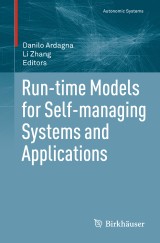Details

Run-time Models for Self-managing Systems and Applications
Autonomic Systems
|
53,49 € |
|
| Verlag: | Birkhäuser |
| Format: | |
| Veröffentl.: | 15.11.2010 |
| ISBN/EAN: | 9783034604338 |
| Sprache: | englisch |
| Anzahl Seiten: | 185 |
Dieses eBook enthält ein Wasserzeichen.
Beschreibungen
The complexity of Information Technology (IT) systems has been steadily incre- ing in the past decades. In October 2001, IBM released the “Autonomic Computing Manifesto” observing that current applications have reached the size of millions of lines of code, while physical infrastructures include thousands of heterogeneous servers requiring skilled IT professionals to install, con?gure, tune, and maintain. System complexity has been recognized as the main obstacle to the further advan- ment of IT technology. The basic idea of Autonomic Computing is to develop IT systems that are able to manage themselves, as the human autonomic nervous system governs basic body functions such as heart rate or body temperature, thus freeing the conscious brain— IT administrators—from the burden of dealing with low-level vital functions. Autonomic Computing systems can be implemented by introducing autonomic controllers which continuously monitor, analyze, plan, and execute (the famous MAPE cycle) recon?guration actions on the system components. Monitoring acti- ties are deployed to measure the workload and performance metrics of each running component so as to identify system faults. The goal of the analysis activities is to determine the status of components from the monitoring data, and to forecast - ture conditions based on historical observations. Finally, plan and execute activities aim at deciding and actuating the next system con?guration, for example, deciding whether to accept or reject new requests, determining the best application to servers assignment, in order to the achieve the self-optimization goals.
Stochastic Analysis and Optimization of Multiserver Systems.- On the Selection of Models for Runtime Prediction of System Resources.- Estimating Model Parameters of Adaptive Software Systems in Real-Time.- A Control-Theoretic Approach for the Combined Management of Quality-of-Service and Energy in Service Centers.- The Emergence of Load Balancing in Distributed Systems: the SelfLet Approach.- Run Time Models in Adaptive Service Infrastructure.- On the Modeling and Management of Cloud Data Analytics.
This edited volume focuses on the adoption of run-time models for the design and management of autonomic systems. Traditionally, performance models have a central role in the design of computer systems. Models are used at design-time to support the capacity planning of the physical infrastructure and to analyze the effects and trade-offs of different architectural choices. Models may also be used at run-time to assess the compliance of the running system with respect to design-time models, to measure the real system performance parameters to fill the gap between design and run-time. Models at run-time can also assess the compliance of service level agreements and trigger autonomic systems re-configuration.
Run-time models are receiving great interest, since, e.g., power management of CPUs and resource management in virtualized systems can be actuated at very fine grain time scales. In such situations, traditional performance techniques evaluating the systems steady state may provide only a rough estimate of system behavior and are not effective to react to workload fluctuations.
This book includes advanced techniques and solutions for the run-time estimation of autonomic systems performance, the analysis of transient conditions and their application in advanced prototype environments.
Run-time models are receiving great interest, since, e.g., power management of CPUs and resource management in virtualized systems can be actuated at very fine grain time scales. In such situations, traditional performance techniques evaluating the systems steady state may provide only a rough estimate of system behavior and are not effective to react to workload fluctuations.
This book includes advanced techniques and solutions for the run-time estimation of autonomic systems performance, the analysis of transient conditions and their application in advanced prototype environments.
Investigate concepts, models and tools for the run-time management of autonomic computing systems at very fine-grained time scales and in transient conditions Introduces the main challenges and future re- search directions for the adoption of run-time models to support next generation cloud based autonomic systems Includes supplementary material: sn.pub/extras
Diese Produkte könnten Sie auch interessieren:

Virtual Organizations
von: Luis M. Camarinha-Matos, Hamideh Afsarmanesh, Martin Ollus
Preis: 149,79 €

Quantitative Measure for Discrete Event Supervisory Control
von: Asok Ray, Vir V. Phoha, Shashi Phoha
Preis: 96,29 €
-
-
© 2024 media control GmbH
Alle Preise enthalten die gesetzliche Mehrwertsteuer. - AGB
- Impressum
- Datenschutzerklärung
- Kontakt
- FAQ
- Mein Konto
- Home
- Erweiterte Suche
- Widerrufsrecht
- Reader-Software
- Desktop-Ansicht
- Gutschein-Code einlösen
